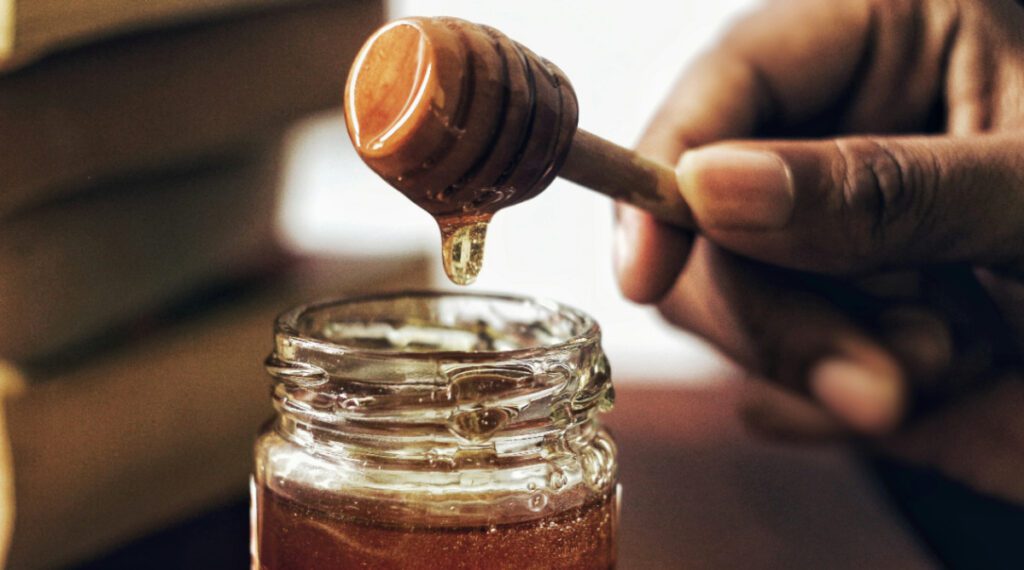Honey has been a treasured food across cultures for millennia. It is known for its subtle sweetness and a taste that varies depending on the local flora and season.
Honey not only delights the senses—it is also nourishing, healing, and pure. If you tip over a jar of honey, you will notice that it flows slowly. It is rather sticky. Honey also takes the tireless and strenuous effort of bees to produce.
The virtue of angelic sweetness can be likened to honey. Sweetness is not disingenuous happiness. It does not require one to be a people-pleasing doormat. It’s much richer than that.
True sweetness is nourishing, healing, and pure. We exhale in the presence of people who are angelically sweet. They extend kindness, safety, and encouragement to everyone they encounter. They are not too busy for us. They seem to live slowly, letting the Holy Spirit set the pace. Their warmth is compelling. We want to stick around them.
We, too, are called to be a place of comfort for others; however, our sticky sweetness is meant to point them to Someone greater.
This is why the sweetness is angelic. The Greek word for “angel” means “one who brings a message.” As God’s messengers, angels always direct attention to Him. Mary received the Father’s sweet proposal through an angel (see Luke 1:26-38). So to be angel-like is to be a messenger. To be angelically sweet, then, is to be a messenger of sweetness. We are not the source of sweetness, we are called to be the mirroring messengers as Mary was.
Angelic sweetness looks like anticipating the needs of others. It is presence, attentiveness, and doing what we can to care for even the smallest needs of others. It is taking our time, considering each person before us. Practicing the virtue of sweetness is especially powerful in the overlooked details because it sends a message about God’s attentiveness to even the smallest moments of our lives.
Angelic sweetness also eradicates bitterness. We have many earthly reasons to grow cold and bitter, but the message of God is that the warmth of His goodness melts hearts of stone.
The virtue of sweetness is not a personality trait. It does not always come easily. We must be open to the movements of the Holy Spirit. To be a messenger of God’s sweetness is to first receive it ourselves.
Like Mary, may our genuine sweetness toward others nourish their hearts, slow their minds, and stick their souls to Jesus.
At the Wedding Feast at Cana, our Lady exemplified angelic sweetness. She was attentive to the needs of the newlyweds, extended her maternal care and protection to them, and supported her Son in His work.
Enter into the scene beside Mary. Be present with her in her “home” and learn from her.
Scripture
On the third day there was a marriage at Cana in Galilee, and the mother of Jesus was there; Jesus also was invited to the marriage, with his disciples. When the wine failed, the mother of Jesus said to him, “They have no wine.” And Jesus said to her, “O woman, what have you to do with me? * My hour has not yet come.” His mother said to the servants, “Do whatever he tells you.” Now six stone jars were standing there, for the Jewish rites of purification, each holding twenty or thirty gallons. Jesus said to them, “Fill the jars with water.” And they filled them up to the brim. He said to them, “Now draw some out, and take it to the steward of the feast.” So they took it. When the steward of the feast tasted the water now become wine, and did not know where it came from (though the servants who had drawn the water knew), the steward of the feast called the bridegroom and said to him, “Every man serves the good wine first; and when men have drunk freely, then the poor wine; but you have kept the good wine until now.”
// John 2:1-10
What word, verse, or image captures your attention or imagination?
What moves your heart as you observe and ponder Mary’s angelic sweetness?
With Mary’s example and by God’s grace, how might you exercise this virtue in your daily life?
_____________________________________________________________________
This post is an excerpt from Blessed is She’s new study, Home: A Blessed Conversations Study on the Virtues of Mary.
Photo by Arwin Neil Baichoo on Unsplash.




